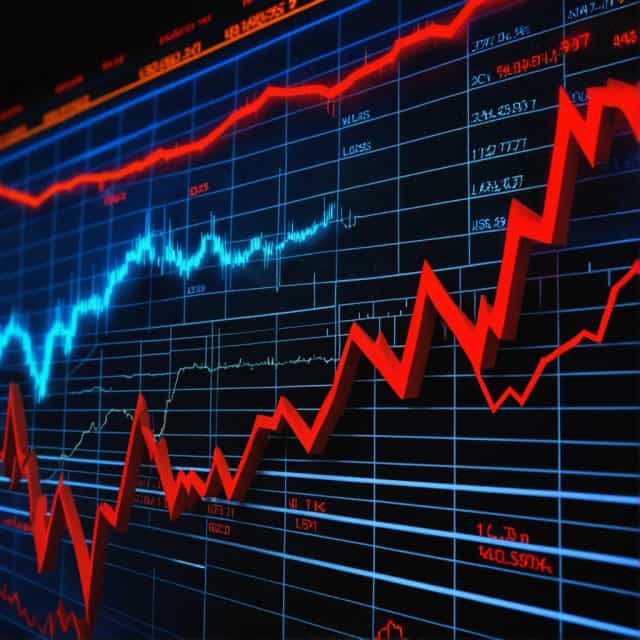
Image source: Block Media
South Korea's KOSPI Index Declines for Third Day Amid U.S. Rate Concerns
South Korea's KOSPI index experienced losses for the third consecutive session on the 25th, driven by waning investor optimism following stronger-than-expected U.S. economic data. This data dampened hopes for near-term interest rate cuts by the Federal Reserve, casting a shadow on market sentiment both domestically and globally.
As of 9:22 a.m. KST, the KOSPI index stood at 3,430.68, reflecting a decline of 40.43 points (1.16%) from the previous session's close. Opening lower at 3,440.39 (a 0.89% drop), the index further deepened its losses throughout the day.
U.S. Market Weakness Fuels Global Pressure
Overnight, U.S. financial markets saw all major indices—the Dow Jones Industrial Average, S&P 500, and Nasdaq Composite—extend their losing streak to three sessions. Concerns over a prolonged restrictive monetary stance by the Federal Reserve were reinforced by robust economic data.
Revised U.S. second-quarter GDP growth exceeded market expectations, while initial jobless claims fell to their lowest level since mid-July. These indicators reinforced perceptions of a resilient U.S. economy, reducing expectations for near-term rate reductions by the Fed. As a result, global equity investors faced heightened concerns about rising rates.
Han Ji-young, a researcher at Kiwoom Securities, commented that Nasdaq losses were partially attributed to valuation concerns in the AI sector, where valuations remain high despite no significant developments. Han explained, "Fading rate-cut expectations are intensifying worries about rising rates, and the compounded effect is evident in both U.S. and South Korean stock market sentiment."
Han further noted that South Korean markets appear to be in a "pause and consolidation phase," with indices expected to trade sideways for the remainder of the month. Sector-specific rotations could take precedence during this period.
Breakdown of the South Korean Stock Market
Within the KOSPI market, individual investors net purchased 4.088 trillion won, while foreign and institutional investors net bought 2.574 trillion won and 1.378 trillion won, respectively. Despite these inflows, the index failed to reverse its downward trajectory.
Sector performances were uneven:
- Gainers included electric power and gas (+1.42%), securities (+0.97%), and insurance (+0.83%).
- Laggards included retail (-0.80%), construction (-0.92%), and transportation and storage (-0.62%).
Among the heavyweights:
- Hanwha Aerospace (+1.48%) and Celltrion (+0.73%) posted gains.
- Most others saw declines, including Samsung Electronics (-2.32%), SK Hynix (-3.65%), LG Energy Solution (-2.49%), Hyundai Motor (-1.38%), and KB Financial (-0.96%).
Kosdaq Extends Losses
The tech-heavy Kosdaq index mirrored the KOSPI, closing at 845.08, a loss of 7.40 points (0.87%). Opening at 847.67 (a 0.56% drop from the prior close), the index saw losses deepen as the day progressed.
In the Kosdaq trading landscape, individual investors net bought 585 billion won, while foreigners and institutional investors sold a net 315 billion won and 152 billion won, respectively, further pressuring the index.
Sector performance on the Kosdaq highlighted gains in transportation equipment and components (+0.01%) and entertainment (+0.13%), while declines were recorded in:
- Metals (-0.87%)
- Electrical and electronics (-1.10%)
- Precision medical instruments (-1.38%)
- IT (-1.28%)
Major Kosdaq players experienced mixed results:
- Alteogen rose 0.22%, and Peptron ended flat.
- However, Samchundang Pharm (-2.88%), EcoProBM (-2.66%), and Rigem Bio (-1.98%) closed lower.
South Korean Won Slides Amid Rate Concerns
In the foreign exchange market, the Korean won weakened against the U.S. dollar. The USD/KRW rate opened at 1,409.0 won, up 8.4 won from the previous day's closing price of 1,400.6 won during onshore trading.
Currency markets reflected heightened caution as traders assessed global monetary tightening trends. The Federal Reserve’s interest rate trajectory remains a critical factor influencing investor sentiment and exchange rates.
Outlook
Market participants are expected to closely monitor upcoming global economic data and further developments in central bank policies. With the Federal Reserve maintaining a hawkish tone, the ripple effects are likely to continue steering both U.S. and South Korean financial markets, fostering an environment of heightened volatility and cautious trading strategies.










